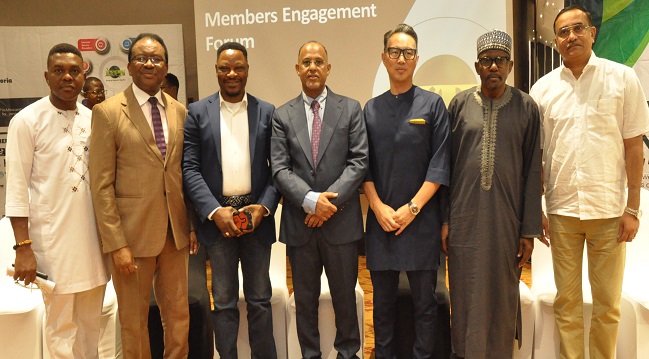Telecom
SSS, Police Get Powers to Tap Phones

Nigeria Communications Commission (NCC) plans to introduce lawful interception (LI), a legally sanctioned official access to private communications, such as telephone calls or e-mail messages in a bid to enhance national security, prevent crime and aid criminal investigations.
Under the initiative, in response to a warrant from a judge, lawful interception is performed simply by applying a ‘tap’ on the telephone line of the target, making it possible for security agencies in Nigeria to listen to terrorist and criminal cell phone calls and gather communications intelligence on their dark activities.
The commission said it is drawing powers from Section 70 of the Nigerian Communications Act, 2003 and all other powers enabling it in that regard.
It has not however fixed a date for the takeoff of the controversial policy which critics said can be used by repressive governments to intimidate opposition.
A draft guideline posted on NCC website requires service providers and Internet service providers to implement their networks to explicitly support authorized electronic surveillance.
“These regulations are made to provide a legal and regulatory framework for the lawful interception of Communications in Nigeria, the collection and disclosure of intercepted Communications. These Regulations shall; provide the legal and regulatory framework for the lawful interception of Communications in Nigeria and to put into effect the provisions of sections 146 and 147 of the Act; specify the nature and types of Communications to be intercepted; prescribe penalties for non-compliance with these Regulations; provide a notification procedure to the Commission of all Warrants issued, amended renewed or cancelled under these Regulations; ensure the privacy of subscribers as contained in the Constitution of Federal Republic of Nigeria is persevered” the commission said.
According to the NCC, a fine of N5 million awaits a service provider or any of its officers which fails to comply with the provisions of the regulation.
“If such an offence is continuing, such a Licensee or officer shall be liable to a daily default penalty of N 500,000; the Commission may revoke the License of the Licensee for failure to comply with the regulation. The Commission shall give a prior written notice to the Licensee of such revocation, not less than [30] days to the withdrawal of the License. In addition the Commission may institute an action for non-compliance by way of an injunction or a specific performance or any or such other judicial means of enforcing a duty or obligation imposed on a Licensee pursuant to this regulation” it said.
Nigeria CommunicationsWeek gathered that though lawful interception has existed since the inception of electronic communications in the form “wiretapping”, it has become increasingly necessary now because of the sophistication of criminal enterprises in exploiting emerging communications channels.
The criminal activities pose real challenge to organizations responsible for protecting public safety including the police and courts,
It would be recalled that office of the National Security Adviser (NSA) had in early 2010 summoned all telecom operators in the country recently and tabled the proposed initiative.
At the meeting were the House of Representative Committee on Communications, telecom operators as well as the minister of information and communications
The office of the NSA had given all technical data to lawful interception and requested its vendors to contact their consultant for any clarification.
The office has also given a deadline which expired on July 6, 2010 for all technical enquiries following which it is expected to release the implementation schedule for the lawful interception.
Nigeria CommunicationsWeek gathered that the federal government has directed its consultants to put in place law interception provisions including secure access to protect information and insure network integrity.
It is also expected to be undetectable with secure transport to authorized law enforcement agencies as well as scalable and high availability to accommodate changing network environments.
Lawful interception is expected to help address concerns over ARPU, telecommunications fraud, denial of service attacks, customer satisfaction, and growing security fears – particularly over global terrorist activities.
Chijoke Nwosu, a security consultant applauded the initiative and said that in today’s unstable environments, the need for intelligence information is vital in preventing and combating crime. He however warned that high security requirements for LI systems are important to prevent possible manipulation and misuse.
Nodding in agreement, John Iyene Owobokiri, Nigeria CommunicationsWeek in-house legal expert, however said that Lawful interception has a strong legal basis.
According to Owobokiri, there is need to complement the multifaceted regulation of lawful interception with elaborated provisions of law concerning the requirements for the design and development of lawful interception systems.
On the other side of the divide, concerns have been raised as critics said such move would amount to infringement of peoples’ privacy.
Amnesty International is concerned by instances where the provision of powerful surveillance and interception capabilities to repressive states are contributing to human rights violations carried out by the police, security and intelligence forces.
Though the organization said that it is not opposed to the transfer of surveillance in general, but such technologies have inherent capabilities that facilitate human rights abuses by security forces in repressive countries.
Telecom
Cyber Immunity Emerges as Shield for Nigerians Amid Rising Scams

Cyber immunity is gaining traction as essential defence for everyday Nigerians facing surging online scams, phishing attacks, and SIM swap fraud that now target ordinary smartphone users.

Once limited to corporations, threats like fake bank alerts, WhatsApp investment links, and account takeovers have infiltrated daily digital life, outpacing basic antivirus and passwords.
Digital Immune System for Resilience
Cyber immunity integrates devices, apps, and user habits to prevent, detect, and recover from breaches, mimicking a body’s immune response rather than relying solely on firewalls.
Modern smartphones exemplify this with instant app restrictions, suspicious site warnings, and secure hardware for payments and biometrics, curbing damage from human errors like clicking bad links.
In Nigeria’s fintech-driven economy—banking, shopping, education online—individuals lag behind banks in security, making consistent vigilance critical.
Practical Steps Build Personal Defences
Key actions include password managers with 2FA and biometrics, automatic updates for vulnerability patches, cautious browsing (verify URLs, shun urgent requests), and routine data backups to cloud or external drives.
Ignoring updates to save data heightens risks on dominant Android devices, while messaging app scams demand wariness.
Technology aids via OS behaviour detection and isolation, reducing third-party app reliance for safer defaults.
As Nigeria’s digital expansion accelerates, cyber immunity shifts security from one-off setups to ongoing habits, averting minor scares from escalating to major losses.
Telecom
Uwaje Pays Tribute to Leo Stan Ekeh @70

Renowned digital innovation expert, Prof. Chris Uwaje, has celebrated Leo Stan Ekeh as a visionary “digital anticipator” and pioneer on the occasion of his 70th birthday.

Leo Stan Ekeh
In a heartfelt tribute, Uwaje hailed Ekeh as the “Saint Leo of all Stars from the Ekeh Universe,” saluting his masterclass contributions to human innovation, development, and global youth empowerment.
Visionary Impact on Africa, World
Uwaje praised Ekeh’s foresight, emotional intelligence, and resilience in transforming digital entrepreneurship, creating millions of jobs, billions in economic value, and expanded education access worldwide.
The encomium spotlighted Ekeh’s trailblazing solutions driving sustainable development, employment, and economic growth across Africa and beyond.
“Your legacy continues to shape a brighter future,” Uwaje noted, adding that Ekeh’s “extraordinary best is yet to come” as the “Field-Marshall of ANTICIPATORS.”
Cheers to More Foresighted Legacy
Uwaje declared: “From the gaze into the digital cloud: ‘the world ain’t seen nothing yet’!” while toasting Ekeh as the “true digital Conqueror of Africa and the world.”
The tribute underscores Ekeh’s enduring influence in digital disruption, innovation, and youth-focused initiatives that continue to inspire global progress.
Telecom
IXPN Positions as the Regional Internet Exchange Hub for West Africa

Internet Exchange Point of Nigeria is positioning as a regional Internet Exchange hub for West Africa in terms of infrastructure and traffic. Muhammed Rudman, chief executive officer, IXPN, stated this at its 2026 members engagement forum held in Lagos. He noted some of the major milestone IXPN achieved last year to include one terabit of traffic recorded in March 2025.

“At that time, we became the 63rd internet exchange point in the world. Among all the exchanges in Europe and America and in the entire world, we become the number 63 in the world. To achieve that one terabit of traffic. Again, we were able to achieve two terabits of traffic within seven, eight months of the year.
“We achieve this by ensuring that we push for members to upgrade, those that were on 1 Gig to 10 Gig, those on 10 Gig to 100 Gig. We had a strategic infrastructure upgrade across our networks, put 400 Gig enable switches, increase our fiber links to all the data centers and we onboarded 17 new members last year. All the trainings and the operational excellence ensured that our network is up and running 24/7,” he said.
Industry Impact
The impact of that one terabit traffic is data sovereignty. “We were able to domesticate. Based on the survey we conducted, 54% of our members said that they are exchanging 50% of their traffic and above locally, which is really, significant one.
“We are also setting up a benchmark for other African IXPs. I can assure you that in all the community driven internet exchange points in Africa, we are the number one. There’s a community driven internet exchange point in South Africa that was established 10 years before IXPN. There is one in Kenya that was established 6 years before IXPN, but we are way ahead of them when it comes to internet traffic.
“We are also promoting intra African connectivity. As at today, we have customers from Niger, from, Burkina Faso, trying to reach to Nigeria. Recently, we onboarded a very large company in Ivory Coast, to connect to Nigeria.
“Gradually, Nigeria is tilting towards becoming the regional hub for West Africa, where you see Internet Service Providers coming to achieve that. And in terms of the traffic, in 2015 we were at four Gigabits per second. It moves to 21 in 2017 and 52 gigabits per second.
“But by the year 2023 it has reached 540 gigabits. By 2024 we have reached 900 gigabits. But by the end of 2025 we have achieved the two terabits of traffic”.
Network Infrastructure Development
Some of the technical feet IXPN achieved includes, deployment of sFlow; which is a peer to peer traffic analysis. “We’re able to see what members are exchanging between themselves and between the data centers, not the actual content or information, but rather the volume of traffic, and also between our data centers. And based on this, we’re able to do the upgrades.
“We did a multiple link upgrades from 300 Gigabits last year from Digital Realty to Equinix. It was 300 Gig as at the end of 2024, and by 2025, we’ve increased that to 500 gigabits per second. Digital Realty to Rack Center, it was 200 Gigabits per second. We also upgraded that to 500 Gigabits per second.
Open Access Data Centre to Equinix. We’ve upgraded from 20 Gigabits per second to 200 Gigabits per second. We always monitor the ports, and based on that, we increase immediately we reach the threshold of 80%.
“We did an upgrade on the IXP manager. This allows each member to have a login portal to see the traffic they are exchanging and other details, the port as well as to do their own configuration,” he added.
Technical Project Milestones
Microsoft connected cache. “We deployed Microsoft content cache and that has been deployed in Lagos. It was 25 Gigabits per second as of 2024 by 2025 we had to upgrade the infrastructure to 75 Gigabits per second servers, that will be able to accommodate all the Microsoft updates they are doing, exports, download and among others.
“This is part of the content that Microsoft is not providing locally, but we got those servers deployed, and our intention is by next year to see how we can replicate this across the country. Last year, we also deployed the same server in Abuja so that the Abuja people and the Kano people can reach that content without coming back to Lagos.
The Google Global Cache (GGC); “We are hosting all these at IXPN. We also upgraded from 53 Gigabits per second servers in 2024 to 153 Gigabits per second. And this is a huge traffic of YouTube. And as we speak, we are also working towards upgrading those servers,” he explained.
Strategic Partnerships
“We signed an MoU last year between us and an IXP in Senegal, when we went for West African peering forum. A lot of African ISPs are looking to us to see how we can guide them and support them.
“For example, internet exchange point from Gabon, internet exchange point from Rwanda and ISPs in Africa are looking at us as a model to copy, and we tend to support them. We also had a strategic partnership with CIRA, the Canada Internet Registry Association, which is similar to Nira, the Nigerian Internet Registration Association, to have their secondary authoritative servers into Nigeria as an anycast instance. And when they are hosting that, they are hosting other top-level domains as well, like alibaba.info.org.ca, are also hosted with us.
“Since they launched last year, we have seen a traffic of over 1000 DNS responses per second. Presently, there are 13 global root servers in the world, and those 13 servers are the ones that translate your IP address into a domain name. Any website you browse, you put a domain name, it translates into an IP address and its chain of referrals, Nigeria has.ng as a country, called Top Level Domain”.
Earlier in his welcome address, Charles Nmeregini, Business Development Manager, IXPN, said that the members engagement forum is more than an annual country. “Today, we pause to celebrate the milestone, the milestone that we have reached together, the milestone that have bolstered our local traffic exchange, reduce latency and significantly lower the cost of Internet access across the nations and beyond.
“However, today is equally about the horizon. It is a strategic moment as we unveil our 2026 service road map, a forward-looking rubbing designed to deepen interconnection, enhance service delivery and unlock new value across the ecosystem. In an era defined by rapid technological shift, standing still is not an option.
“This forum will spotlight exclusive, strategic business opportunities, new avenues for growth, enhanced pairing capabilities and innovative service model tailored to give your organization a competitive edge. We are not just exchanging data, we are exchanging ideas that will drive the next wave of Nigeria digital economy,” he added.

 Telecom2 days ago
Telecom2 days agoGroup Condemns Gabon’s Social Media Shutdown Amid Protests

 General News2 days ago
General News2 days agoHow JustMarkets Is Empowering African Traders with Global Market Access

 Telecom2 days ago
Telecom2 days agoIXPN Positions as the Regional Internet Exchange Hub for West Africa

 E-Business2 days ago
E-Business2 days agoMutual Benefits Assurance Settles ₦5.9bn Claims in January 2026

 Telecom2 days ago
Telecom2 days agoMenxtt NG Emerges as Nigeria’s Virtual IT Hub for Premium Devices, Solutions

 Broadcasting2 days ago
Broadcasting2 days agoPheelz Shares His Journey on Glo-Sponsored African Voices

 E-Business2 days ago
E-Business2 days agoNITDA DG Reaffirms FG Commitment to Responsible and Inclusive AI

 News2 days ago
News2 days agoAI-Driven Memory Chip Fuels Global Phone Price Surge














